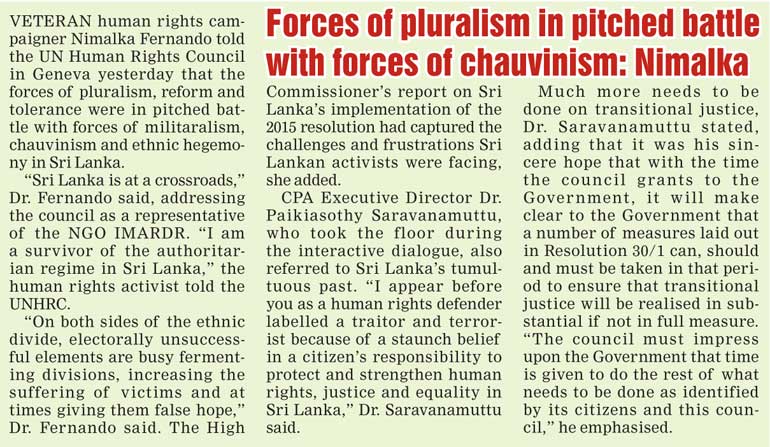Tuesday Feb 24, 2026
Tuesday Feb 24, 2026
Friday, 24 March 2017 00:57 - - {{hitsCtrl.values.hits}}
By Dharisha Bastians in Geneva
Foreign Minister Mangala Samaraweera in a recent meeting had referred to Human Rights Chief Zeid Ra’ad Al Hussein as the ‘international nag’, the UN high official himself quipped during remarks to the Human Rights Council in Geneva on Wednesday.
“The Foreign FM of SL in the meeting I had with him the other day, referred to me as the ‘international nag’. I ‘nag’ on them to make good on their promises and their commitments,” Zeid told the 47-member council in his concluding remarks on the interactive dialogue on Sri Lanka.
“We will continue to do that,” the High Commissioner vowed, calling on the international community and the rest of the UN family to assist his Office and the Government.
Zeid said the OHCHR would continue to advise, continue to be vigilant, continue to attempt to persuade.
“As we have noted, and many others have noted, the frustrations are real and they are growing,” he warned.
In his final remarks, the UN’s Chief Envoy for Human Rights told the Human Rights Council that the point made about the necessity for a hybrid court in the report on an investigation into allegations of war crimes in Sri Lanka released in September 2015 deserved further consideration from the Government, in light of the Consultations Task Force recommendations and the lack of outcomes in emblematic cases of impunity during the war. “The need for a hybrid mechanism is therefore something we continue to underscore,” Zeid noted.
Zeid also appeared to disagree with remarks made by Tamil National People’s Front Leader Gajendrakumar Ponnambalam during the civil society component of the interactive dialogue. “We do not believe that the position of the Government means that all is lost, as suggested by the first speaker from civil society. We believe that we will continue to work with the Government in a constructive manner, but one in which we will continue to impress on the desires of victims to see their suffering placed at the centre of any discussion focusing on the future of the country,” he said.
In his intervention, Ponnambalam noted the High Commissioner’s call that Sri Lanka accede to the Rome Statute that set up the International Criminal Court and repeated rejections of the hybrid court by the President, Prime Minister and key members of the Government in Sri Lanka.
“Would the High Commissioner agree that a further two years to implement resolution 30/1 after the Government has already comprehensively rejected the proposal for a hybrid court would only serve to let the Government off the hook?” the TNPF leader told the Council. “Doesn’t it increasingly appear that only through a referral of Sri Lanka to the International Criminal Court or by setting up of an international ad hoc tribunal that justice for victims is likely?” he added.
